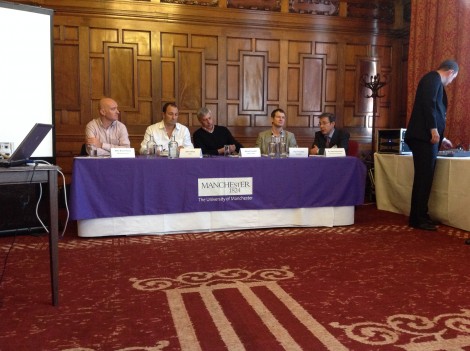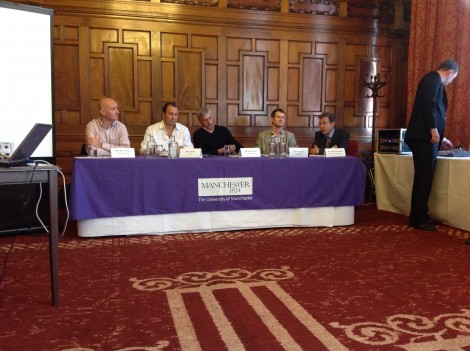CYFOR MD speaks at Manchester Business School Summit

CYFOR MD speaks at Manchester Business School Summit

Joel Tobias, CYFOR founder and MD, was invited last month to be a panellist at the Manchester Business School’s 2014 ‘Disruptive Technologies’ Summit. The event, held at the Palace Hotel in central Manchester, attracted over 150 MBA students.
The topic under discussion was “Big Data Analytics – Finding Patterns” – one of the hot business topics of the day, and the room was filled with enthusiastic students armed with numerous questions.
The panel addressed itself, through Panel Moderator, Dr. Ilias Petrounias, Senior Lecturer at Manchester Business School, to questions around how patterns, trends, intelligence and context can be extracted from this data.
The panel also considered how technology can be used to access Big Data while making sure it has the right impact on different sectors, and how Big Data analytics is shaking up traditional technologies, business perspectives and regulatory frameworks.
Joel Tobias said: “Our “hyper-changing world” necessitates a new way of thinking about Big Data. The new availability of large amounts of data, along with the statistical tools to analyse the numbers, offers a whole new way of gaining an understanding of the world.”
Joel Tobias was joined by leading figures in the field: Mike Broomhead, Software Client Architect at IBM Big Data Analytics; Adrian Conduit, Director at Hitachi Consulting, and Glyn Powditch, CTO & Co-Founder at DreamAgility.
Volume, variety, velocity and veracity
The entire panel spoke about volume, variety, velocity and veracity: volume and variety – the misnomer of the validity of Big Data because of its different forms whether textual or rich media, internal or external, structured or unstructured; velocity – the need to preserve data rapidly in real-time; and veracity – how we can trust Big Data from social media, for example.
Data-driven decisions
Glyn Powditch commented on his retail experience of testing webpages in real-time to determine which responded best, allowing a business to playback successful pages. He had seen a £23 million improvement in sales based on one particular data-driven decision.
The panel agreed that data needs to be structured. Joel Tobias said that, in terms of the data quality that CYFOR deals with, they have the tools to easily handle unstructured data, but getting it out from a database can present challenges.
Summary of other discussion topics
Topics also touched upon included: the consumer-driven demand for open-source; issues of data privacy and security, particularly in the healthcare arena, the problem being privacy versus control, i.e. what will subsequently happen to an individual’s data once it has been shared within organisations where there are multiple players?; data stored in the cloud and the implications for cross-border regulation: which country is this data actually in?; what are the skills needed of managers?: technical skills will always be in high demand but the skills will inevitably change, managers need to make sure data is seen in context.
Big Data – bringing it all together
The panel agreed that once the right data is in place, CEOs should be concerned with the big questions that may be answered by Big Data and the priority in which they may be ordered. An organisation may have highly qualified PhDs analysing data and gaining insights, but these must answer real-world questions; how can Big Data provide predictive outcomes particularly in the context of performance monitoring consumer-devices.
Given the growing availability of data incorporating location information, Joel Tobias advised the audience that we have to collect a broad sense of data so that months and years down the line we can fully realise its value. Although he warned against gathering low-level data and hoped that it will find its right level.
Clearly the panel managed to cover a lot of material in a relatively short time. The audience was left to consider that not only does Big Data analytics enable us to answer different types of questions, but it also opens the door to many new types of analysis. The possibilities are truly endless.
Call us today and speak with a Forensic Specialist
Send an enquiry to our experts
After submitting an enquiry, a member of our team will be in touch with you as soon as possible
Your information will only be used to contact you, and is lawfully in accordance with the General Data Protection Regulation (GDPR) act, 2018.